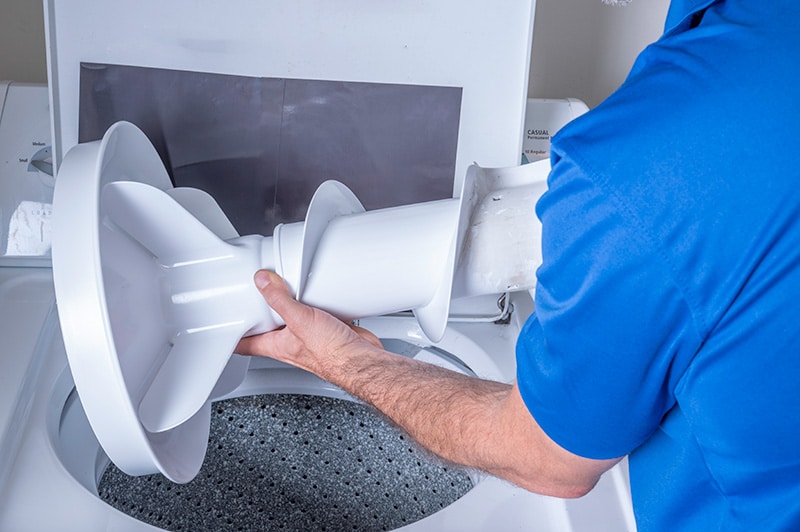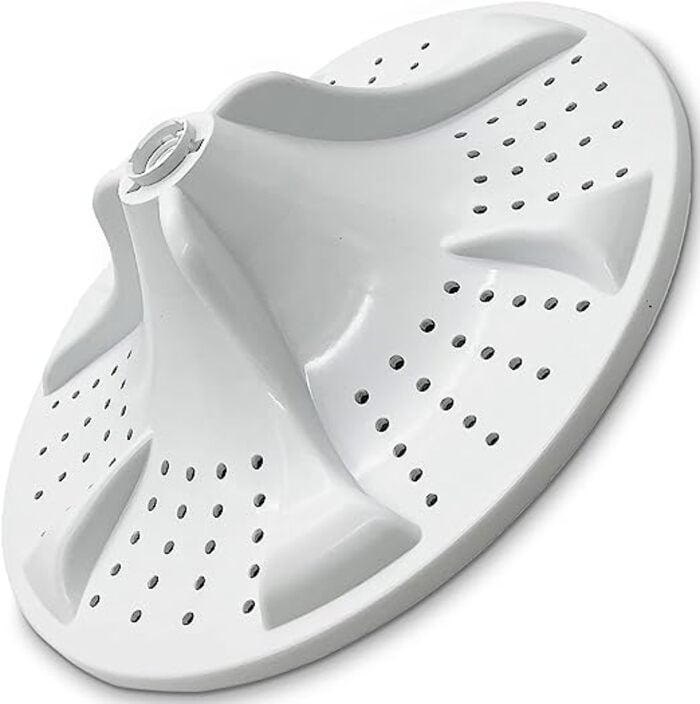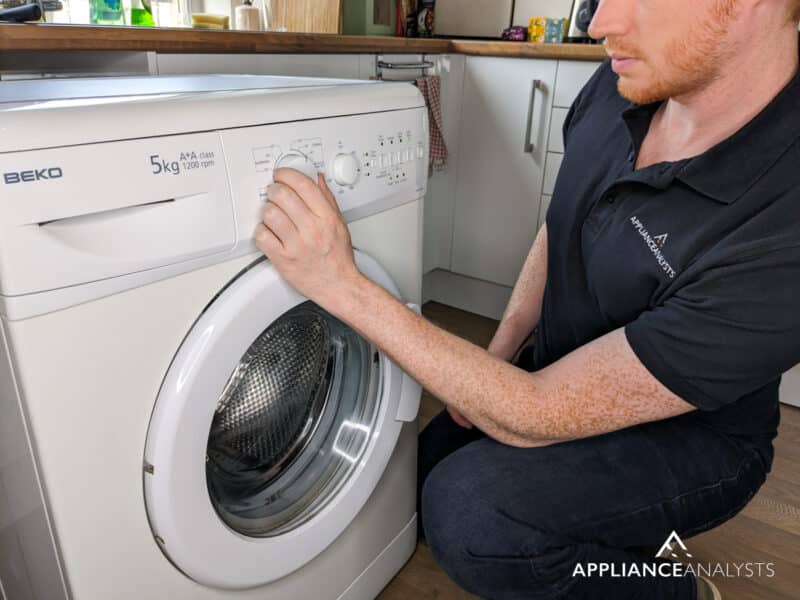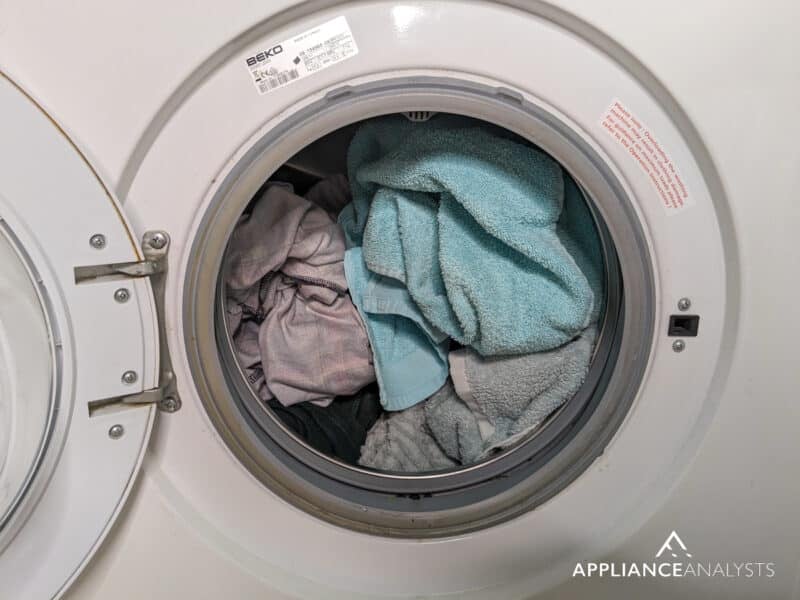We've independently reviewed this article to make sure it's as accurate as we can make it.
To find out more about our article creation and review process, check out our editorial guidelines.
Ever found yourself wondering about the differences between agitator and impeller washers?
If you’re in the market for a new washing machine, you’ve probably come across these terms and wondered what the difference is and which one is right for you.
Luckily, you’ve come to the right place.
The main difference between agitator vs impeller washers is their cleaning mechanism. Agitator washers move clothes back and forth, making them great at cleaning heavily soiled items. Impeller washers, on the other hand, move clothes in a circular motion and are more energy-efficient.
Read on to choose the right washer!
Why trust us? This article was written by Craig Anderson and James Blackford.
Craig has helped thousands of other homeowners repair their appliances since 2016.
James is one of our resident appliance experts with over 16 years of experience. He currently works as a Master Technician for SquareTrade, and runs his own appliance repair business.
Agitator vs Impeller Washer: 8 Differences
If you’re struggling to understand the main differences between an agitator and an impeller washer, don’t worry.
In this section, I’ll guide you through the most important details to consider when comparing both types of washers.
#1 Cleaning Mechanism
I find that the biggest difference between agitator and impeller washers is their cleaning mechanism.
The agitator design features a central post with paddles that move back and forth to effectively dislodge dirt from your clothes. Often equipped with vanes, agitators create friction to eliminate dirt and stains, thoroughly cleaning your garments.

While agitator washers provide a powerful clean, they are more prone to breakage than impeller washers, as they rely on their central columns. If the central column breaks or malfunctions, it’s essential to consult a professional who can assess and test the washer.
On the other hand, an impeller washer has a disc-shaped design to clean your clothes with minimal water and motion. It spins your laundry in a circular pattern, driving garments from the outer edge of the wash basket toward the center.

Impeller washers also offer more space for accommodating bulky items such as blankets and cushions, as they are specifically designed to allow ample room for laundry movement.
#2 Cleaning Performance
When comparing agitator vs impeller washer, you must consider their cleaning performance.
The agitator’s vigorous motion helps remove tough stains and ground-in dirt from heavily soiled garments. On the other hand, Impeller washers provide a gentler cleaning action that is more suitable for delicate fabrics.
While some argue that impeller washers aren’t as effective at removing tough stains as agitator washers, many modern impeller models have improved their cleaning performance through advanced wash cycle options and technology.

However, if you work with materials prone to staining, such as grease or oil, I recommend getting an agitator washer.
Cleaning Performance Winner: Agitator Washer
#3 Efficiency
Now, let’s compare impeller vs agitator washers in terms of efficiency.
Agitator washers, usually top-loading machines, submerge your clothes in water during the entire washing process. Unfortunately, this approach requires more water, making them less efficient than impeller washers.
On the other hand, impeller washers move clothes in a circular motion without fully submerging them in water, resulting in reduced water and detergent usage.
So, when it comes to efficiency, impeller washers generally take the cake. Their design and motion require less water to clean clothes effectively and tend to use less energy overall. It makes them a more eco-friendly option and can save homeowners money on their water and electricity bills over time.
Impeller washers have another energy-saving advantage: their high spin speeds extract more water from the clothes, making them less damp when you remove them. It means your clothes will dry faster, even if you’re using one of the best dryers available.
However, it’s worth noting that some newer agitator models have made strides in efficiency, incorporating features like automatic water level adjustment and improved wash cycles to reduce water and energy usage.
Tip: To enhance the eco-friendliness of any washing machine, consider washing at lower temperatures. Although higher temperatures are necessary for killing bacteria, sanitizing your machine, and combating detergent buildup, using cooler water for regular washes can save energy.
Efficiency Winner: Impeller Washer
#4 Load Capacity
When deciding between an agitator and an impeller washer, my usual advice is to consider the load capacity of each option.
Regarding load capacity, impeller washers typically have the upper hand. Their drum design allows for larger loads, making it easier to wash bulky items like comforters, blankets, or large quantities of clothing. It can be a huge time-saver for busy households or those who prefer to do less frequent laundry sessions.

Agitator washers, while still capable of handling a decent amount of laundry, generally have a smaller load capacity due to the space taken up by the central agitator.
As a result, washing larger or bulkier items can be more challenging and require additional laundry sessions to get through your household’s clothes.
Load Capacity Winner: Impeller Washer
When loading an agitator or impeller washer, be careful not to overstuff the drum. It’s also important to distribute the clothes evenly to make sure the load is balanced and avoid spinning issues.
#5 Noise and Vibration
Now, let’s compare impeller vs agitator washers regarding noise and vibration.
If you’re sensitive to noise or your laundry area is close to living spaces, I recommend getting an impeller washer.
Impeller washing machines tend to operate more quietly than their agitator counterparts, thanks to their gentle tumbling motion and lack of a central agitator that can create additional noise and vibration.
While not necessarily loud, agitator washers tend to produce more noise and vibration during operation. It is due to the vigorous motion of the agitator and the resulting movement of the water and clothes within the drum.
Tip: If noise concerns you, check the decibel ratings of any washing machine you’re considering.
Noise and Vibration Winner: Impeller washers operate more quietly.
#6 Convenience and Flexibility
Regarding convenience and flexibility, I find that impeller washers are better than agitators. Their top-loading design and lack of a central agitator make it easier to load and unload laundry, significantly larger or bulkier items.
Many impeller washers have various wash cycle options and features, such as delay start, steam cleaning, and customizable water temperature settings.
Agitator washers, while offering a good level of convenience, are more limited in wash cycle options and features. The presence of the central agitator can also make loading and unloading more cumbersome, particularly for larger items that need to be maneuvered around the agitator.
Convenience and Vibration Winner: Impeller washers
#7 Durability
I often advise homeowners to consider durability when comparing impeller vs agitator washers.
With their simple and time-tested design, agitator washers tend to be more durable and long-lasting than their impeller counterparts.
The absence of complex mechanisms means fewer parts to wear out and break down over time.
Although generally more efficient, impeller washers can be more susceptible to wear and tear due to their intricate mechanisms. It is not to say that impeller washers are not durable, but they can require more maintenance and repairs than agitator washers.
Durability Winner: Agitator Washer
#8 Ease of Use
When it comes to ease of use, I find that agitator washers are more user-friendly than impeller machines. With a traditional top-loading design, it’s easier for users to load and unload laundry without bending down.
It can be particularly beneficial for older individuals or those with mobility issues. Agitator washers also usually have simpler controls and fewer settings, making them less intimidating for those needing to be tech-savvy.
While offering more advanced features and settings, impeller washers can be more complicated. The controls can require some time to get used to, and the front-loading design can be more difficult for some users to manage.
Ease of Use Winner: Agitator Washer
Agitator vs. Impeller Washer: Pros and Cons
If you’re still undecided between an agitator or an impeller washer, check out the following pros and cons tables I’ve prepared to help you decide.
Agitator Washer Pros and Cons
| Pros | Cons |
|---|---|
| Agitators excel at removing tough stains and handling heavily soiled clothes. | Agitators can be harsh on delicate fabrics, potentially causing damage or wear over time. |
| They have shorter wash cycles, enabling faster laundry turnaround times. | They can consume more water and energy compared to other types of washing machines. |
| More budget-friendly compared to other washing machine types. | Cause more tangling and twisting of clothes, potentially leading to damage. |
| They are user-friendly, featuring straightforward controls and settings. | Agitators need more capacity for larger items like blankets or bulky clothes. |
| Agitators are preferred for washing heavily soiled items, such as work clothes or sports gear. | They can be noisy during operation, particularly during the agitating cycle. |
Impeller Washer: Pros and Cons
| Pros | Cons |
|---|---|
| Impellers offer gentle washing action, ideal for delicate fabrics and preventing wear and tear on clothes. | Impellers may not be as effective at removing tough stains and heavy soiling as agitators. |
| They boast larger drum capacity, accommodating larger laundry loads like comforters or blankets. | Prone to tangling clothes, especially those with loose weaves, long straps, or ties. |
| Impellers consume less water than agitator washing machines, resulting in potential water savings and lower bills. | Impeller washing machines have longer wash cycles than agitators, which require more laundry time. |
| Produce less noise and vibration during operation than agitators. | They’re typically pricier than agitator washing machines. |
| Impellers feature sleek, modern designs that can complement the aesthetics of your laundry room or space. | Not suitable for washing heavily soiled items (like grease and oil stains), as their gentler washing action can be less effective. |
They usually come with various wash cycle options and settings, allowing customization based on fabric types and soiling levels. | Impellers require more frequent cleaning and maintenance to prevent buildup and ensure optimal performance. |
FAQs: Agitator vs. Impeller Washers
Are agitator washers rougher on clothes than impeller washers?
Agitator washers, particularly top-loading ones with a center-post agitator, can be rougher on clothes because the paddles create more friction, leading to more wear and tear.
On the other hand, Impeller washers are generally gentler on clothes, as they use a tumbling motion to clean garments without the intense agitation of an agitator washer.
Can I wash delicate fabrics in an agitator or impeller washer?
Both agitators and impeller washers can handle delicate fabrics, but you should take precautions, such as using a delicate cycle or a mesh laundry bag, to protect fragile items.
Impeller washers are better for delicate fabrics, as they are typically gentler on clothing.
Which type of washer is more water-efficient?
Impeller washers are generally more water-efficient, using a high-speed spinning motion to clean clothes without fully submerging them in water.
Agitator washers, on the other hand, usually require more water to immerse the clothes during the cleaning process fully.
Are impeller washers always front-loading, and are agitator washers always top-loading?
While it is common for impeller washers to be front-loading and agitator washers to be top-loading, there are exceptions.
Some top-loading washers use an impeller instead of an agitator, providing a more efficient and gentle cleaning experience. It’s essential to check the washer’s specifications before making a decision.
Which type of washer has a faster wash cycle?
Agitator washers typically have shorter wash cycles than impeller washers, as the agitation process can clean clothes more quickly. However, this can come at the expense of more wear and tear on clothing and less water efficiency.
Is adding or removing clothes mid-cycle in an agitator or impeller washer easier?
Top-loading agitator washers generally make adding or removing clothes easier mid-cycle because you can lift the lid and access the drum. With front-loading impeller washers, you usually have to pause the cycle and wait for the door to unlock before accessing the drum, which can take longer.
Are washers without agitators a better choice?
The debate between washers without agitators (impeller models) and those with agitators depends on individual preferences and needs.
Impeller models can be superior due to their water and energy efficiency and their gentler clothes treatment. However, agitator washers can clean heavily soiled clothes more effectively.
Do impeller washers perform as well as agitator washers?
Agitators and impeller washers each have their unique features. While agitator washers utilize a central post with paddles to clean clothes, impeller washers rely on a small disc at the bottom of the tub, which creates a whirlpool-like action.
The choice between the two often comes from personal preference, laundry demands, and available space.
Wrapping Up: Deciding Between Agitator and Impeller Washers
Hopefully, now you know the main differences between impeller and agitator washers.
Choose an agitator washer if:
- You need powerful cleaning action for heavily soiled garments.
- You prefer a more traditional washing machine design.
- You don’t mind using more water and energy.
Choose an impeller washer if:
- You require gentle washing action for delicate fabrics.
- You value energy and water efficiency.
- You want a washing machine with a larger load capacity and easier loading and unloading.
If this article has helped you, please check out our articles below for more guidance on selecting the perfect washing machine for your home.
Thank you for reading!







